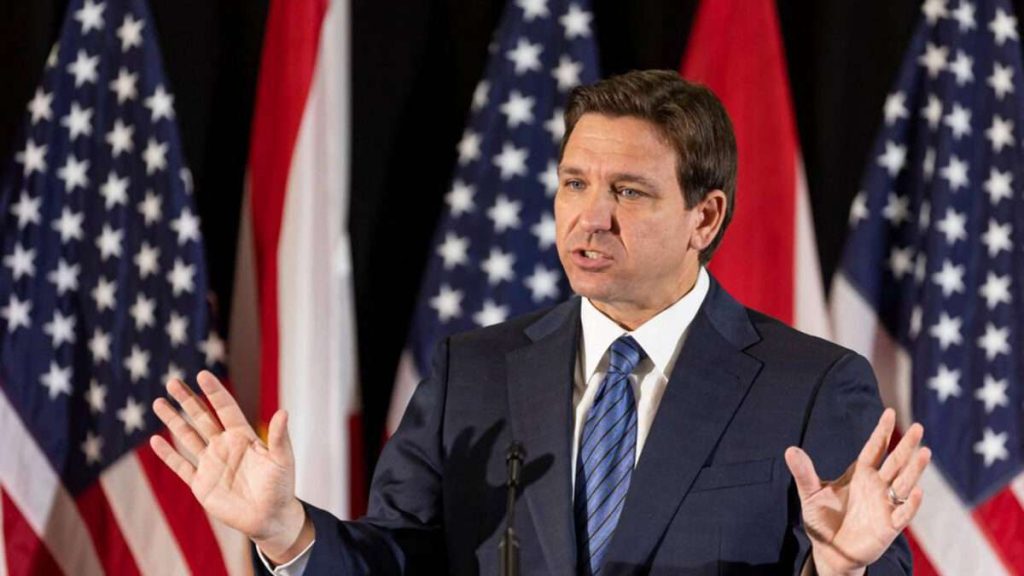Ron DeSantis, who officially launched his presidential campaign last week, presents himself as a champion of individual freedom against overweening government. But as governor of Florida, DeSantis has repeatedly contradicted that stance by blurring the line between state and private action, a distinction that is crucial to protecting civil liberties.
During the pandemic, DeSantis not only opposed government-imposed vaccination mandates. He decreed that business owners could not ask customers to present proof of vaccination, and he proudly signed legislation prohibiting vaccination requirements by private employers.
That law also barred school districts from imposing mask mandates. But DeSantis did not stop there: He pushed legislation “permanently prohibiting COVID-19 masking requirements at businesses.”
DeSantis said that bill, which he signed into law a few weeks ago, was aimed at curtailing the “biomedical security state.” He thereby equated business owners’ voluntary decisions with coercive government policies.
DeSantis’ insistence on overriding those private decisions belies his description of Florida as “an oasis of freedom” with a “business-friendly environment.” When it comes to vaccination and masks, he recently told John Stossel, Florida has “consistently sided with the individual,” which is accurate only if you ignore individuals whose business policies DeSantis does not like.
The same is true of the Individual Freedom Act, the Orwellian name of a Florida law also known as the Stop WOKE Act. Among other things, it purported to dictate private employers’ training practices, a provision that a federal judge blocked last year because it violated freedom of speech.
A Florida law that required social media platforms to carry messages from political candidates met a similar fate. Although DeSantis presented that mandate as a response to “Big Tech censors” who discriminate against conservatives, three Republican-appointed judges on the U.S. Court of Appeals for the 11th Circuit unanimously concluded that it was squarely at odds with the editorial discretion protected by the First Amendment.
“Platforms are private enterprises, not governmental (or even quasi-governmental) entities,” the appeals court noted. “While the Constitution protects citizens from governmental efforts to restrict their access to social media,” it said, “no one has a vested right to force a platform to allow her to contribute to or consume social-media content.”
DeSantis’ determination to punish private businesses for exercising their First Amendment rights is even clearer in his spat with Disney, whose former CEO irked him by criticizing a Florida law restricting discussion of sexual orientation and gender identity in public schools. DeSantis retaliated with legislation aimed at seizing control of the Reedy Creek Improvement District, which had governed the area surrounding Disney World since 1967.
DeSantis complained that “a corporation based in Burbank, California,” was using its “economic might” to “attack the parents of my state.” But who is the real bully in this situation: an executive who makes constitutionally protected comments or an elected official who wields state power to exact revenge for those comments?
DeSantis’ conflation of private and state action is also apparent in a new state law that sharply restricts real estate purchases by Chinese citizens who legally live in Florida but do not have green cards or U.S. citizenship. He says that law reflects his “commitment to crack down on Communist China” by resisting “the United States’ greatest geopolitical threat—the Chinese Communist Party.”
The Florida residents who recently challenged the law in federal court, who have nothing to do with the Chinese Communist Party, are understandably puzzled by that rationale. They have lived in the United States for years with student or work visas, and they do not understand why they should suffer for the crimes of an oppressive regime they left behind.
Whether the putative target is the “biomedical security state,” wokeness, “Big Tech censors,” or Chinese Communists, DeSantis’ grandstanding poses a clear threat to individual rights. It reflects the agenda of supposedly conservative culture warriors who have embraced state power as a solution to their grievances, recklessly abandoning the distinctions on which their own liberty depends.
© Copyright 2023 by Creators Syndicate Inc.
The post Ron DeSantis Dangerously Blurs the Line Between State and Private Action appeared first on Reason.com.







